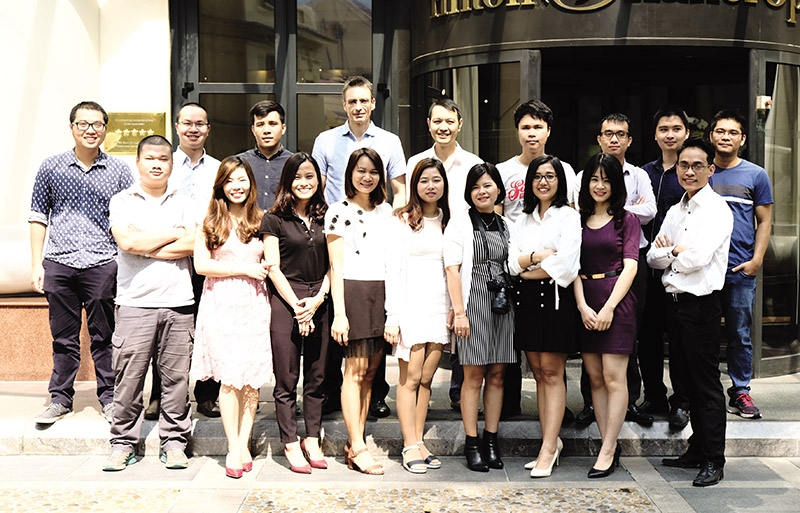More efficiency via data management
 |
| Pierre Bonnet, co-founder of Orchestra Networks |
Setting up Orchestra Networks with only a small group of engineers must have been quite a journey. How did you manage to go from such humble beginnings to where you are now?
Created in 2000, the DNA of Orchestra Networks was already data management. However, at the time, organisations and companies were more interested in process management (workflow) and deeply attracted by the first round of digitalisation brought about by the new Internet and e-commerce landscape.
A couple of months later, the collapse of the stock market due to an Internet bubble froze the worldwide business for several years. During this period, Orchestra Networks worked hard with some early adopters, big companies (banks, retailers) who considered that the crisis period was the best time to reinvent the future of their businesses by better controlling risks and innovation budgets.
It was clearly aligned with our DNA and raison d’être: developing a software to manage data as a core asset. We also spent a lot of energy on promoting our vision to the market by writing several books on data management and rating of information systems. We established several think tanks to create an ecosystem for thinkers and partners around Orchestra Networks.
In 2005, market analysts (with Gartner in the lead) started talking about “Master Data Management” as a key element to sustain success in the digital economy, then moving data to the front stage. The curtain on data was raised, and all our efforts to educate the market was awarded, enhancing the visibility of Orchestra Networks around the world, and allowing the company to accelerate its growth.
When was the official milestone that Orchestra Networks switched from a startup to ‘smart-up’?
There were two startup periods. During the first five years (2000-2005), the company was a startup working with some early adopters, spending money mainly on software development and relatively little on marketing efforts. The second startup period took place between 2005-2010, during which we gained recognition from the market thanks to analysts who identified us as a clear player in the Master Data Management landscape. We executed our operations with pure organic growth, investing 100 per cent of our profit into reinforcing our engineering teams and marketing, staying within our domestic region, France and Europe.
From 2010, the company shifted to a smart-up company by accelerating our commercial and marketing ability to act, expanding to the US market. We kept full control of the company shares, piloting all decisions.
From 2010 to 2018, the company has followed the smart-up growth and is now recognised as a worldwide leader in Data Management and Data Governance by analysts. The company profit was reinvested in our operations, exempting us from getting external investment. Today, we are reaching a new, transformative step from smart-up to what we call “sustainable company,” or one that will last for a very long time with a solid legacy for future generations.
 |
| Orchestra Networks’ talented and dynamic Vietnamese team stands ready to help businesses optimise their data management protocols |
Mobilising sizeable investment is notoriously difficult for a startup. Can you share how Orchestra Networks did it?
We raised money in two rounds. The first round was to create the company in 1999-2000. At that time, there was a lot of excitement in the financial market to invest in startups, sometimes even when the business plans were super fuzzy and limited.
At Orchestra Networks we had a different approach. We were looking for a short-term investor for the first two years to prevent the co-founders from using up their money. We established a very detailed and strong business plan to push up the company value, limiting the impact of investors on shareholders. After two years, the co-founders made a buyout of the investors’ shares to retrieve 100 per cent control over the company.
The second round was done in 2011 when we decided to start our operations in the US, aiming to accelerate our commercial activities. For this investment, we decided to rely on a sustainable equity partner who would be able to provide us with some corporate governance and then push us to follow the best, state-of-the-art financial and accounting processes in the equity and financial market.
What is the greatest value that Orchestra Networks brings to its customers?
Orchestra Networks is a pure player in the Data Management and Data Governance landscape. We provide the market with an “all in one” solution to manage and apply governance processes on the data assets. Our software carries all features needed by business users and data stewards: data modelling, data authoring, full search, versioning, audit trail, quality control, data analytics, data approval workflow, and data visualisation, and so on. Moreover, the solution relies on an innovative data modelling approach called “model driven.” This means that from the data model, all the features of the platform can be automatically generated to make the solution available to end users.
No specific programming skill is required to set up a generic use of data governance suitable for a company or organisation. Afterwards, a rich API (micro-services) allows for adaptation of the software into the context of each organisation and company. This model-driven approach is also important to avoid any “big bang” change to the information system of our clients, who include Citibank, Paramount, TechnipFMC, United Technology, and Burger King, who would never accept such an approach. A more incremental and agile deployment of data management and data governance is needed. Thanks to the “model-driven” engineering lifecycle, it is possible to increasingly enrich the data models over time. This is a great strength of our solution.
What do you hope to achieve through your upcoming ‘Data Management: The new challenge beyond Industry 4.0’ event? What potential do you see in Vietnam?
Our first goal is to connect people to share knowledge and practices on the importance of good data management. Most of the time, data management processes are quite poor, showing limited efforts in modelling. We expect this conference to show attendees some cases of good use of data to support intelligence and decision processes.
In particular, for a fast-growing market, the question of how to scale the country up while keeping under control a massive flow of information, knowledge, and data, is vitally important. The ability to align businesses with international regulations is also a part of good data management. Vietnam is a fantastic fast-growing country and I believe this conference is a good opportunity to highlight the opportunities to go further with data management.
What the stars mean:
★ Poor ★ ★ Promising ★★★ Good ★★★★ Very good ★★★★★ Exceptional
Related Contents
Latest News
More News
- Digital shift reshaping Vietnam’s real estate brokerages (December 31, 2025 | 18:54)
- Allen & Gledhill recognised as Outstanding M&A Advisory Firm (December 18, 2025 | 14:19)
- Inside Lego Manufacturing Vietnam (December 18, 2025 | 11:45)
- The next leap in Cloud AI (December 11, 2025 | 18:19)
- Vietnam’s telecom industry: the next stage of growth (December 11, 2025 | 18:18)
- Five tech predictions for 2026 and beyond: new era of AI (December 11, 2025 | 18:16)
- CONINCO announces new chairman and CEO (December 10, 2025 | 11:00)
- How AWS is powering the next-gen data era (December 09, 2025 | 13:14)
- Outlook in M&A solid for Singapore (December 08, 2025 | 10:31)
- Vietnamese firms are resetting their strategy for global markets (December 05, 2025 | 17:04)

 Tag:
Tag:


















 Mobile Version
Mobile Version